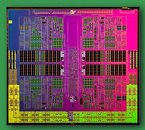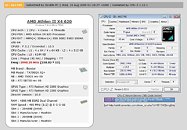Friday, August 28th 2009

Some Athlon II X4 Chips Mutate to Phenom II X4
The latest in AMD's almost deliberate series of processors that unlock into powerful / more capable processors is the Athlon II X4. Some of the earliest batches of these sub-$150 quad-core processors can be converted to more powerful Phenom II X4 chips using a simple trick. When unlocked, the chip will be equipped with 6 MB L3 cache. Supposed to have been based on the "Propus" core that physically lack a L3 cache, apparently early batches continue to use the "Deneb" core with L3 cache locked (using moist threads instead of a padlock). Currently there's no information as to which specific batches of Athlon II X4 620 and Athlon II X4 630 work. The trick works on some motherboards that support the Advanced Clock Calibration (ACC) feature. Simply set the ACC option in the BIOS setup to "Auto" from its default value of "Disabled", and you're done.
Source:
Silicon Madness


30 Comments on Some Athlon II X4 Chips Mutate to Phenom II X4
the REAL question is is the processor stable after its unlocked???? E.g a tri-core can be unlocked to a quad but theres a 50/50 chance that it wont be 100% stable.
what good is cache when the processor is unstable?
you cant do anything on an unstable processor since its gonna crash all the time.
Oh and as an aside not related to this at all, congrats W1Z, TPU, and realtemp for making CPU Magazines Appalooza list this year!
--------------------------
On topic: I think this is a great marketing idea from AMD. I might just have to buy one of these to see if I get the lucky batch;)....well if the price is right.
Even thought they are not directly marketing 4 cores with X2 chips per say....Without locking the "bad" two cores out AMD is basically saying this "Buy this X2 chip...You may be able to unlock and use 4 but if not you only paid for 2". I see nothing wrong with this and is good for consumers who know what they are buying. Same thing they are doing with the L3 cache.
(By the way, try to see this as an OEM, not an end-user!)
Based on that ideology, I think that the majority of users unlocking these cores aren't practicing any sort of it's-okay-that-it-crashes-every-day-or-two computing, they're simply saying that they're okay with a known defect which, as time will tell, they'll probably never see.